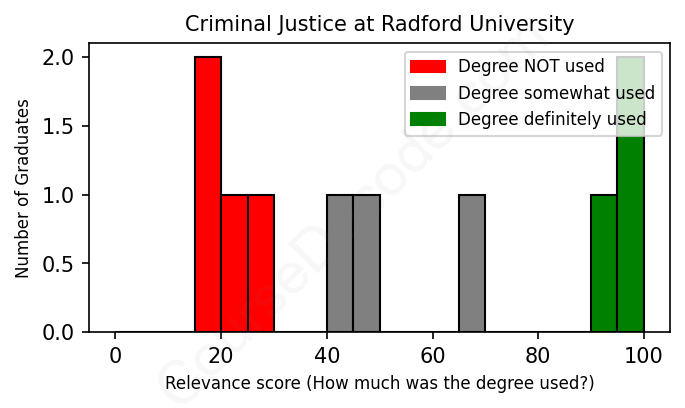
First, some facts. Of the Criminal Justice graduates from Radford University we've analyzed , here's how many have used (or NOT used) their degree in their career:

These are estimates based on AI analysis of 10 LinkedIn profiles (see below).
The verdict? Significantly below average. Overall, with an average relevance score of 52%, Criminal Justice graduates from Radford University have a much lower likelihood (-15%) of finding work in this field compared to the average graduate across all fields:
And for comparison, here's the chart for all profiles we've looked at across all degrees.
Also, after graduating, only 20% of these graduates have pursued further education other than another Bachelor's degree (such as a Masters degree or other), compared to the average across all profiles of 35%. This suggests a Bachelors degree is enough for most Criminal Justice graduates, and it's normal to look for work straight after graduation.
See the details:
|
Relevance score: 100% We think this person has gone into a career highly relevant to their degree. We think this person has gone into a career highly relevant to their degree.
DEGREE INFOGraduated in 2016 from Radford University with a Bachelors Degree in Criminal Justice. No other secondary education since. JOB HISTORY SINCE GRADUATIONPatrol Officer New Kent Sheriffs Office May 2016 - Present ABOUTNo information provided. |
The top 10 most common jobs done by the graduates we've analyzed (ranked most common to least) are:
After analyzing the job outcomes for graduates from Radford University's Criminal Justice program, it becomes clear that there's a mixed bag of employment paths taken by these individuals. Many have landed roles that are quite relevant to criminal justice, like the Drug Court Surveillance Officer and Patrol Officer positions, which explicitly utilize their coursework and skills from their degree. Positions within correctional systems or those with direct responsibilities in law enforcement and legal proceedings show a strong correlation to their studies, reflecting how some graduates have successfully translated their education into meaningful careers in the field.
On the flip side, a significant portion of graduates have ventured into jobs that are not really related to criminal justice at all. Many have taken roles in management, customer service, or even coaching sports, which typically don’t require criminal justice knowledge. Jobs like Restaurant Manager or Corporate Recruiter highlight this disconnect, emphasizing that not all graduates find themselves working directly within criminal justice fields. Overall, while some paths clearly align with their education, others seem to drift away from criminal justice, suggesting that the applicability of their degree can vary widely based on personal interests and career choices.
Here is a visual representation of the most common words in job titles for Criminal Justice graduates (this is across all Criminal Justice graduates we've analyzed, not just those who went to Radford University):

It looks like graduates from Radford University with a degree in Criminal Justice have taken a pretty mixed bag of career paths after graduation. For many, the first job seems to be somewhat relevant to the field, like working as a Drug Court Surveillance Officer or a Patrol Officer. It's nice to see that some of the alumni have continued in law enforcement or related roles over the years, with positions like Drug Court Administrator and Crime Analyst coming up. This suggests that a solid number of graduates find their niche within the criminal justice system, which is great for those looking to make a direct impact in their community or within the legal system.
On the other hand, there are quite a few grads who veered significantly off the path, ending up in recruiting, coaching, and other unrelated fields. Some have jobs in customer service or management within completely different sectors, like construction or staffing. It might not be a sign of unsuccessful careers necessarily, but it does raise the question of how aligned their current roles are with their degree. So, while some of these grads are carving out successful lives in criminal justice, others seem to be exploring a broader range of opportunities, perhaps finding their way as they go. It definitely shows that a Criminal Justice degree can be versatile, but it might take a little longer for some to land in a job they are truly passionate about related to their major.
Hey there! So, when it comes to a Bachelor’s degree in Criminal Justice, like the one at Radford University, it’s generally considered to be on the easier side compared to some other majors—like engineering or physics, for example. Sure, you'll have to dive into some theories, policies, and maybe case studies, but it's pretty manageable overall. Most of the coursework is pretty straightforward and focuses on understanding the system rather than complex math or heavy scientific concepts. Plus, if you’re already interested in criminal justice, that makes the learning process a lot more enjoyable! Just stay on top of your readings and assignments, and you should be just fine!
Most commonly, in the LinkedIn profiles we've looked at, it takes people 4 years to finish a Bachelor degree in Criminal Justice.
Looking at these graduates from Radford University, it seems like their earnings have been a mixed bag overall. The early career starts, like the Manager role at Longhorn Steakhouse or security positions, probably didn’t pay too high, but some of them eventually moved into more serious roles in criminal justice and management, like the Drug Court Administrator or Aftermarket Manager positions, which likely offer better salaries. However, some folks have continued in coaching or entry-level roles that might not be raking it in. So, while a few seem to be on paths towards decent paychecks, others might still be figuring things out financially. It seems like they’re all at varying stages of their careers, with some definitely doing better than others in terms of earnings.
Here is a visual representation of the most common words seen in the "about" section of LinkedIn profiles who have a Bachelor degree in Criminal Justice (this is across all Criminal Justice graduates we've analyzed, not just those who went to Radford University). This may or may not be useful:

Here are all colleges offering a Bachelor degree in Criminal Justice (ordered by the average relevance score of their Criminal Justice graduates, best to worst) where we have analyzed at least 10 of their graduates: